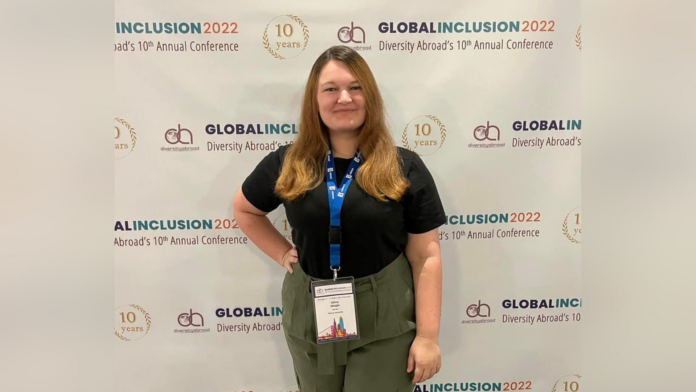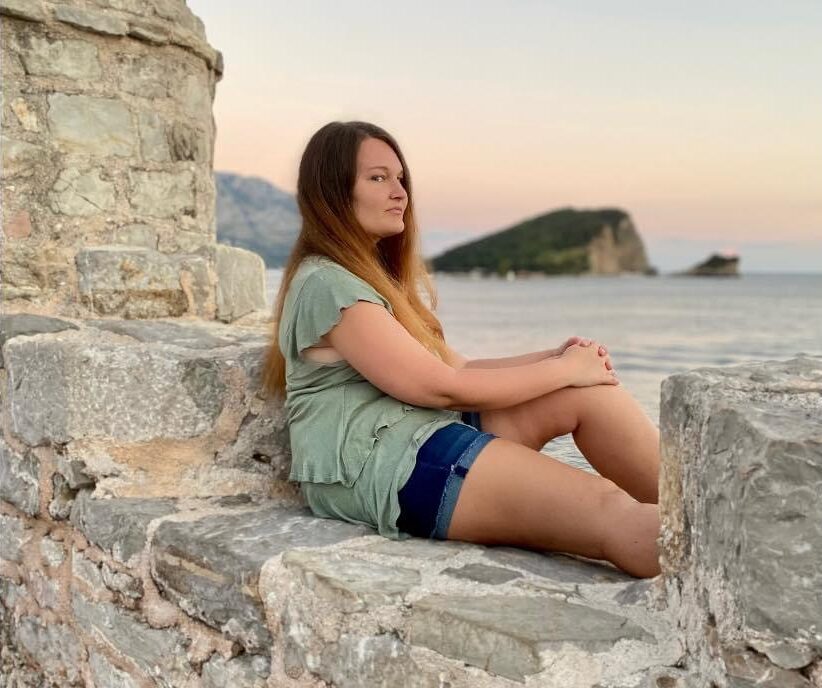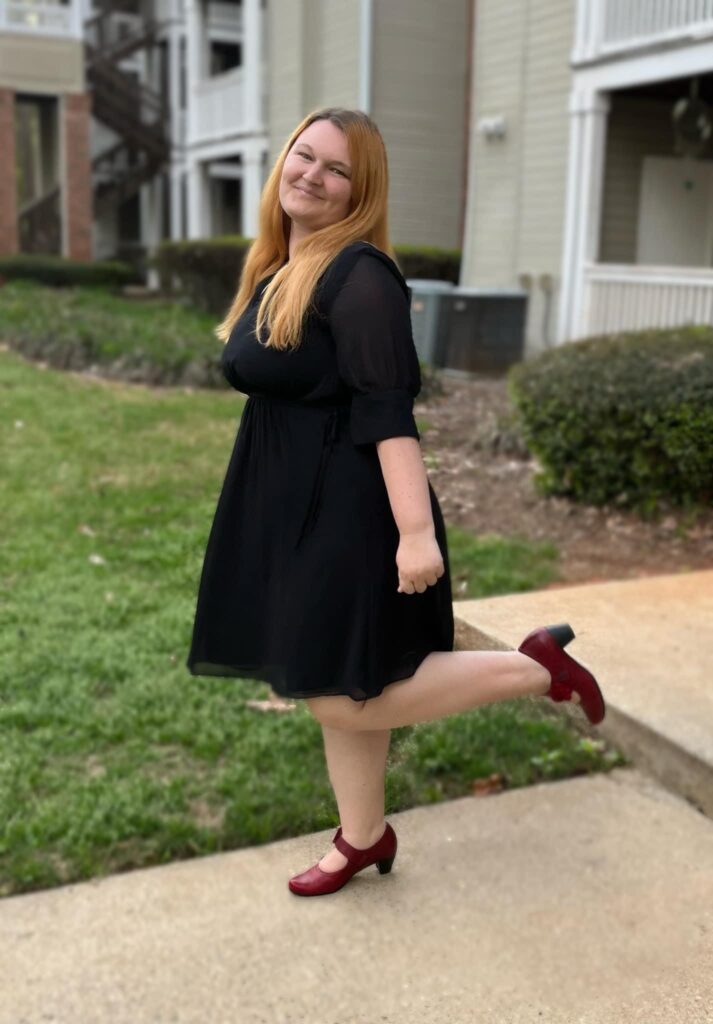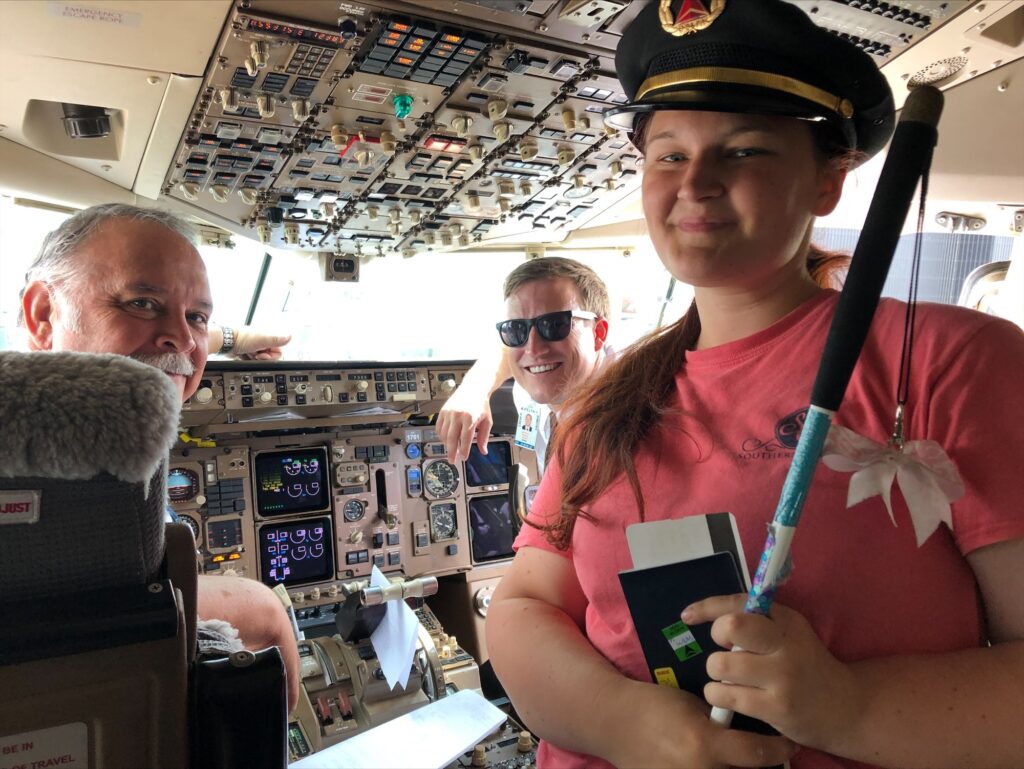
After her high school graduation, Johna Wright traveled independently for the first time to accept a scholarship at a National Federation of the Blind conference in Orlando, Florida. That experience showed her how many navigational challenges exist for people like herself who are blind or have low vision, and it launched her passion for disability advocacy work.
The 2020 Mercer University psychology graduate, now coordinator of fellowships and scholarships, is working to bring more awareness to disability rights. She hopes to help Mercer become a trailblazer among colleges through a unique program.
After starting college at Mercer, Wright went to Washington, D.C., multiple times to lobby for the Accessible Instructional Materials in Higher Education Act, which passed in 2018 and focuses on providing instructional materials in a timely manner to college students with visual impairments.
“I started getting to network with other blind leaders and learn about the different possibilities out there for me,” she said. “It was such a new world that had opened up. I started to realize how, even on a campus like Mercer, which is a lot more accessible than some, there are still a lot of accessibility issues. If no one else is going to do this, then it becomes my responsibility.”
Wright expanded upon her advocacy work and learned about disability laws and policies in other countries as she studied abroad. She participated in a Mercer On Mission trip to South Africa and spent a summer in Sweden for an exchange program through the Gilman Scholarship and a semester at the University of Essex in England as a Global Leader Scholar. Following graduation, she earned a master’s degree in comparative social policy and welfare at Tampere University in Finland through a Fulbright Award.
She also gained valuable experience while working with the Human Rights Action Unit of the European Parliament in Brussels, Belgium, and Strasbourg, France.
“This allowed me to scale my own advocacy work while also being exposed to policy and advocacy efforts internationally. I felt empowered to speak up and demand access for myself and others,” she said.

Wright is involved with the National Federation of the Blind and National Association of Blind Students, for which she serves as vice president of the student division, president of the community service division, legislative advocacy committee chair, and media liaison.
She also mentors high school and college students and works with a couple of organizations abroad, including Finnish organization Abilis.
Wright is working to revive and expand a peer-mentoring program that she founded as a Mercer student. With support from Mercer’s Visionary Student Panel mini-grant program in 2017, she launched ABLE Mercer, which pairs upperclassmen with disabilities and freshmen with disabilities.
The program saw success and growth in its pilot years but went idle after Wright graduated. Now, Wright and students in her INT 201: Building Community course are laying the groundwork for a “bigger and better ABLE Mercer,” she said. In addition to relaunching the peer mentoring, another goal is to create a training curriculum to help faculty and staff better accommodate students with disabilities in their classes.
This is the second semester that Wright has taught her INT 201 course, which she built from scratch and themed around “demystifying disability.” But it’s the first time it has contained a service-learning component.
The disabled community is not often talked about, and most people don’t know about the disability rights movement, Wright said. Students in her course read firsthand accounts of life with different disabilities and discuss portrayals of disability in Hollywood and the media, as well as misconceptions. They also see how they can be advocates.
“I really want to shed a light on the disabled community through this course,” Wright said. “I teach them about their role in creating an accessible Mercer and creating an accessible world. Once I teach them this and equip them with this knowledge, you can see the figurative light bulbs going off in their heads.”


Earlier this semester, Wright’s students conducted guided interviews with students, faculty and staff to gauge perceptions of disability on campus and areas in need of improvement. Now they are analyzing that qualitative data. Later this spring, the class will host a campus town hall meeting, so Mercerians can brainstorm ideas for making the University more accessible. The work will continue in Wright’s INT 201 course in the fall.
Once it’s re-established, Wright hopes ABLE Mercer can be a model that is piloted at other universities and maybe even in other countries.
“I aim to create a situation in which Mercer can become a trailblazer among universities for disability rights and accessibility,” she said. “I’m excited to be able to give back to the Mercer community that helped me become who I am today. I believe that this should be everywhere. Every disabled student deserves equal access. They deserve the right to start off on an equal playing field with their able-bodied peers.”
Wright would also like to see colleges make social justice and disability rights a required piece of their curricula.
“Being the only one in my classes and schools who was blind, it caused a rift that maybe wouldn’t have been there if education had been a part. (We need to) start early and continue those conversations,” she said.
In summer 2025, she will lead a Mercer On Mission trip to Nepal that will focus on teaching independent living skills to people who are blind, in addition to providing English language lessons. She hopes students from a variety of majors will participate.
Another one of Wright’s long-term goals is to earn a Ph.D. in higher education leadership at Mercer and write her dissertation on her advocacy work.









